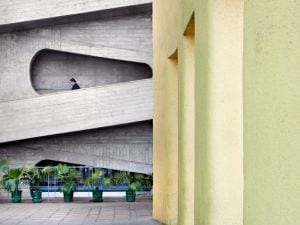International photographer and social practice artist Spandita Malik (b. 1995) collaborates with women across North Indian states to create embroidered portraits that embody and empower their subjects. Malik presents her first solo museum exhibition, Spandita Malik: Jāḷī—Meshes of Resistance at Kemper Art Museum, Missouri, expanding on her 2019 photographic series Nā́rī. For the project, the artist traveled to small communities in India known for their distinct embroidery styles and places where women learn handicraft to gain financial independence. Malik met with women who were part of self-help groups for survivors of domestic and gender-based violence and requested permission to document them within their homes or personal spaces. Each woman was invited to embroider her own portrait in order to claim agency over her portrayal. The resulting photographs are characterised by a colourful and intricate needlework. Throughout, there is a sense of intimacy and respect paid to each subject and her story.


In Rukmesh Kumari IV (2023), yellow petalled flowers spread across a back room. They climb up the walls, sprouting from curtains and picture frames, creating a verdant, floral backdrop. In Parween Devi III (2023), saffron and scarlet stitches surround a mirror. They draw the viewer’s gaze to Parween, who sits on a stool, facing her reflection. To the left, we see an enlarged lock on a closed door, a small indication of the domestic cicrumstances at hand. Elsewhere, in Jyoti (2023), a woman is tethered to her mirror image by a series of gold threads, inextricably linking the two bodies together. Produced in dialogue with many collaborators, the series showcases the unique preferences, desires and fears of the women who comprise the collective. More than this, the pieces also challenge what Malik refers to as the “colonial lens.” She notes, “I have a problem with documentary work done in India for the last few decades. It usually shows a western perspective — high-profile photographers would come and do grandeur projects with rich contrasts and beautiful images of poverty.” In contrast, these are images that focus on individual and regional weaving practices — Chikankari in Lucknow, Zardozi in Jaipur, and Phulkari in Punjab. Malik pays attention to individual desgins; each composition prioritises the self-determination of its subject.

The word jāḷī is recognised across many languages with roots in Sanskrit, referring to the openwork that appears in architecture, metalwork, and embroidery. Here, it refers to the stitches that populate Malik’s compositions. A varied, fine-mesh structure speaks to the support network involved in the project. In the years following Nā́rī, Malik stayed in contact with each subject, connecting them over group chats and phone calls. She explains, “As an artist, I’m closely involved with my work. I’m a perfectionist, and I’ve always had to have complete control over everything that I do. So for me to open it up to collaboration was hard, but it’s been a good experience in letting go a bit, and letting the work live its own life. When I started I was just documenting these women. But now they are my collaborators. We’re working on something together.” Meshes of Resistance challenges gender inequality as it hands over total agency to its subjects. It’s a crucial exhibition that recognises female-led craft as a powerful means of expression and resistance.
Spandita Malik: Jāḷī—Meshes of Resistance | 6 July 2023 – 24 February 2023
Image Credits:
1. Spandita Malik, Rukmesh Kumari IV, 2023. Photographic transfer print on khaddar fabric, phulkari silk thread embroidery. Unique 50 x 65 1/2 inches. Courtesy of Spandita Malik. Art and photo © Spandita Malik
2. Spandita Malik, Jyoti, 2023. Photographic transfer print on khaddar fabric, phulkari silk thread embroidery. Unique 63 1/4 x 47 inches. Courtesy of Spandita Malik. Art and photo © Spandita Malik
3. Spandita Malik, Noshad Bee, 2023. Photographic transfer print on khadi fabric, zardozi embroidery. Unique 64 1/2 x 47 1/2 inches. Courtesy of Spandita Malik. Art and photo © Spandita Malik
4. Spandita Malik (Indian, born 1995), Parween Devi III, 2023. Photographic transfer print on khaddar fabric, phulkari silk thread embroidery. Unique 40 1/4 x 53 1/2 inches. Courtesy of Spandita Malik. Art and photo © Spandita Malik





